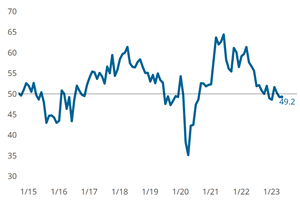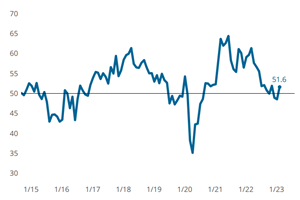Gardner Business Index at 53.6 in April
New orders grow for a fifth straight month; electronics, automotive and aerospace markets expand.
With a reading of 53.6, the Gardner Business Index in April showed that the US composites industry had grown for a fifth month in a row. Although April’s was the slowest rate of growth in 2017, the composites industry still was growing overall at its fastest rate since the first half of 2014.
New orders grew for a fifth consecutive month, but the rate of growth in that subindex decelerated in April for the second month in a row. Although the production subindex grew for the 10th straight month, the rate of growth slowed sharply in April. By contrast, the backlog subindex increased for the third straight month, reaching its highest level since February 2016 and its second highest level since May 2014. The trend in the backlog subindex indicated increasing capacity utilization in 2017. Employment increased for the ninth consecutive month. The rate of growth in employment as April closed out had been constant since December 2016. Exports decreased for a third straight month. Supplier deliveries lengthened significantly during the first four months of 2017. In April, that subindex reached its highest level since March 2012.
Beginning April 2016, material prices had increased at a consistently strong rate — that subindex had remained just below 60 for nine months in a row. But in the three-month period ending in April 2017, the subindex had soared above 70. Notably, these are the only months that the material prices subindex has risen above 70 since the GBI survey was first recorded in December 2011. Prices received increased at an accelerating rate for the sixth month in a row. The rate of increase slowed slightly in April compared to March, but, the subindex had otherwise trended upward since January 2016. Future business expectations still remained comparatively strong through April, but that subindex had nevertheless fallen off steadily since December 2016.
In terms of markets served, the electronics sector in April had recorded strong growth in four of the previous five months. The automotive industry had grown for a fifth straight month. In two of the preceding four months, the automotive market’s subindex had hovered just above 50.0. The aerospace index in April expanded for the sixth month in a row and for the eighth time in 10 months.
Regionally, the US South Central experienced the fastest growth in March. It grew at an accelerating rate for the third month in a row. Both the South Central and the Southeast had a subindex over 60. The Southeast grew at a robust rate for a fourth straight month. The North Central-West and North Central-East maintained their ongoing strong rates of growth. However, the West and Northeast showed contraction.
Facilities with more than 250 employees grew for the fifth month in a row in April, the last three months, with a subindex above 60. Plants with 100-249 employees showed that they’d had strong growth for nine months. Companies with 50-99 employees were at, failing to grow for the second time in three months. Companies with 20-49 employees expanded for a fifth straight month. Companies with fewer than 20 employees contracted after two months of growth.
Related Content
Composites industry GBI contracted faster in July
The GBI: Composites maintains its consistent downward trend for the fifth month in a row.
Read MoreComposites GBI remains relatively unchanged in May
The GBI: Composites closed May at the same reading reported in April, with some minor fluctuations in component activity.
Read MoreComposites industry index ends February in growth mode
The GBI: Composites Fabricating closed February at the same level it was in November 2022, right before experiencing a rare two months of contraction.
Read MoreComposites Index climbs closer to expansion
Rising readings across the GBI build a case for sustained composites growth headed into 2025.
Read MoreRead Next
Plant tour: Daher Shap’in TechCenter and composites production plant, Saint-Aignan-de-Grandlieu, France
Co-located R&D and production advance OOA thermosets, thermoplastics, welding, recycling and digital technologies for faster processing and certification of lighter, more sustainable composites.
Read MoreVIDEO: High-volume processing for fiberglass components
Cannon Ergos, a company specializing in high-ton presses and equipment for composites fabrication and plastics processing, displayed automotive and industrial components at CAMX 2024.
Read More“Structured air” TPS safeguards composite structures
Powered by an 85% air/15% pure polyimide aerogel, Blueshift’s novel material system protects structures during transient thermal events from -200°C to beyond 2400°C for rockets, battery boxes and more.
Read More
.JPG;width=70;height=70;mode=crop)




















